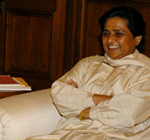Behind the frantic campaigning of young politicians like Rahul Gandhi of the national Congress Party and Akhilesh Yadav of the regional Samajwadi Party, is a story about a state emerging from a black hole of economic and social inequity after decades. The outcome of the elections in UP come March 6, has implications beyond India. A win for the Congress or Samajwadi Party will boost similar dynastic inclinations among leaders and ruling parties in Pakistan, Sri Lanka and Bangladesh. A defeat can cleanse the neighbourhood of an entrenched feudal habit, lower the barriers to entry in politics and encourage the rise of grassroots, representative leaders.
In the last four years, UP – a state long written-off as ungovernable and undevelopable – has been growing at 7% on average. It is, for the first time in decades, on a par with India’s national growth – and if the next government pushes actively for growth, it could outpace the country.
Part of this remarkable progress is the massive number of poverty alleviation schemes being deployed by the state and New Delhi both. Billions have been invested over the last five years. In this regard, UP is a giant welfare lab. But in Indian terms it is also a rare success because even with leakages to corrupt politicians, enough spending has actually made it to the ground to benefit the worst-off.
Simultaneous with the poverty programmes is the infusion of pride for the Dalit – the community lowest on the Indian caste hierarchy for centuries – by Mayawati, the chief minister of the state and a Dalit herself. Her ascent was accompanied by expenditure on a vast variety of public projects – most significantly the Dr. Bhimrao Ambedkar Gomti Park in Lucknow, a magnificent 107-acre public space with statues of Dalit icons like Bhimrao Ambedkar, who wrote the Constitution of India, Lord Buddha who the Dalits worship – and statues of herself. It is transforming Lucknow from a decaying city of Nawabs into a resurgent metro.
On the ground, Mayawati has ensured that her constituency gets the maximum benefits – and they have pulled along much of UP’s poor. There are schools, even some colleges, hospitals and small businesses in the smallest, most dishevelled of villages. There are fewer straw huts and more cemented homes – a development that is changing the very structure of rural society. Every family has children in school and many youth, even those from the most deprived communities, have college degrees.
Now they want more. They want professional colleges like engineering and medicine, sanitation, 24-hour electricity, good infrastructure. And they want jobs closer to home, unlike their parents and grandparents who toiled in Delhi or Mumbai to escape impoverishment.
Mayawati’s biggest challenge is creating those jobs. They won’t come from India’s state sector, notoriously inefficient and captive to political patronage. Private industry had long left UP, fed up with the crime and massive corruption of successive governments. Is this up-from-the-bottom Dalit leader capable of bringing in confident investment? One way could be to galvanize UP’S agricultural potential. The population of this fertile state, through which the Ganges river flows, has embedded farming skills. It could be a hub for rural innovation, providing meaningful work to millions of under-employed peasants while freeing up the educated young for skilled jobs in agriculture-related industry. Imagine a market the size of Brazil – all within India.
Mayawati is a risk-taker. Her actions so far have broken down the old social order by pulling the lower castes out of their accustomed place at the bottom – an example for nearby Nepal and Pakistan where the still-entrenched caste system keeps society feudal and poor.
Some might say Mayawati has a bit of US President Obama in her. She didn’t get to Harvard, but like him, she too is from an unprivileged background. Like him, she has sought change through education and large government programmes. But unlike U.S. leaders who flounder with big spending programmes, Mayawati has shown how effectively it can be done.
Manjeet Kripalani is the former India Bureau Chief of BusinessWeek, and Executive Director and Co-founder of Gateway House: Indian Council on Global Relations.
An edited version of this article appeared in the Indian Express on March 2. You can read the Indian Express version here.
This article was exclusively written for Gateway House: Indian Council on Global Relations. You can read more exclusive content here.
For interview requests with the author, or for permission to republish, please contact outreach@gatewayhouse.in.
© Copyright 2012 Gateway House: Indian Council on Global Relations. All rights reserved. Any unauthorized copying or reproduction is strictly prohibited.


